I had just pulled into work the morning my wife texted me and said, “I think we should sign the papers.” We’d been separated for ten days, and while neither of us wanted to say the word divorce, it was on both of our minds. I wrote back, “Are you sure?” She replied, “I don’t think I’ll ever be sure, but I’m ready.”
I parked my car and said audibly to myself It’s showtime. I had a full day of work ahead of me, kids to teach who had no idea that my life as I knew it was falling apart, and I had to put on a happy face. Over the course of the next week, we signed the papers, filed with the courthouse, and changed our separation agreement to a divorce agreement.
That was six years ago, and even though our divorce will always make me sorrowful, I see now how much both of our lives have improved as a result.
If you’re going through a divorce, or it’s a conversation you and your spouse are starting to have, I’m sorry. I can’t tell you how to fix it, but at the very least, here are a few points to consider along the way.
Slow Down
If your spouse is the first one to approach the conversation because they’re not happy, don’t pack a bag, don’t walk out, and don’t relocate yourself to the guest bedroom. This isn’t the time for overreacting or setting precedents that aren’t healthy. When it feels like your marriage is circling the drain, it’s easy to go into survival mode.
Before you go getting a lawyer and stashing cash under the shed floorboards, slow down, take a few deep breaths. Listen to your spouse and try to understand what they’re saying. Chances are good they’ve said it before. Talk to your parents; talk to your best friend, and talk to your therapist.
Which leads me to the next point…
Go See a Therapist
At Primer, we’re fans of therapy, and pre, mid, and post-divorce are all appropriate times to go. When my ex-wife and I started having the things-aren’t-going-so-great conversation, the first thing we did was find a marriage and family therapist. We had seen a few over the years, but none with whom we really clicked.
We sat down with the therapist and explained where we were. She told us that the three of us would work together to see if we could either save our marriage, or if we couldn’t, make sure that our divorce was amicable and had as little impact on our daughter as possible. Ultimately, our marriage couldn’t be salvaged, but our therapist was a major factor in how respectful we were able to remain throughout the process. After our split, we both continued to see the therapist individually for quite some time; in fact, I still see her to this day.

If you’re having the divorce talk, go see a therapist. If your spouse refuses to participate, then go by yourself. All you can control is how you take care of your own mental and emotional health, and in this process, that matters. If you and your spouse don’t like the therapist, do not take that as a sign that therapy isn’t for you: it simply means that specific therapist isn’t for you. Go find a therapist with whom you’re both comfortable.
Set Some Ground Rules
As weird as it may feel in the moment, you have to remember that you used to love each other (in fact, you probably still do). When my wife and I were separating, we decided there would be no name calling, no raised voices (this was quite difficult at times), and absolutely no arguing in front of our daughter. Oh, we also decided that we wouldn’t speak poorly of the other as our daughter got older. When we cleaned out our house to sell it, we agreed it was ok to laugh, cry, or be silent, but we refused to fight.
Another important rule for us was to agree upon what we were going to share with our friends and families. We agreed that the nitty-gritty details of what got us to this point weren’t anyone’s business. We both had dirt that could make the other look bad or mostly at fault, but that simply didn’t matter. When people asked What happened?! (as if it were just one thing) we agreed to say that we’d grown apart…and after all, that was true.
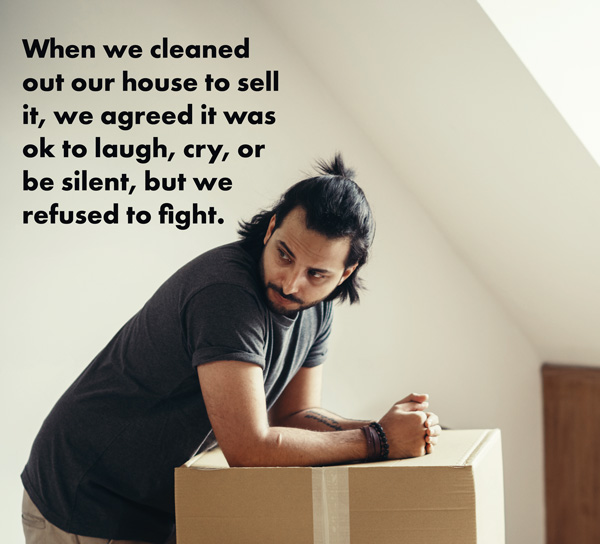
Your Stuff is Stuff and They Still Make Stuff
I came into our marriage with camera equipment – it’s still mine. My ex-wife came into our marriage with equestrian tack (saddles and what not) – it’s still hers. That stuff is easy. The things that are hard to divy up are the things you acquired together: cars, furniture, electronics, dishes, etc. Above all else, remember while you’re having those conversations that these are just things and they can mostly be replaced over time. Be ready to compromise, and accept that neither of you is going to win or lose: you’ll both have to buy some new stuff.
As for pets, well that one is tough. My ex and I had two dogs and a cat. She took the cat, and for a few months we passed the dogs back and forth on a weekly basis, which looking back now seems a little ridiculous. In time she started dating her future husband, and the two of them got a dog together, so our two dogs became my two dogs. I can’t tell you how to decide who gets the pets, but the driving question should be: Who’s new living situation can offer the pets the best quality of life?
If You Can’t Agree on the Money, Get a Mediator
My ex and I never had much money, so for us, it was easy to split what little we had right down the middle. While I was the primary breadwinner, it didn’t seem fair or constructive to squabble over a few thousand dollars. We paid off the credit card, split the savings account, and when our house sold, we split the proceeds. Each of us got a few extra dollars and a clean slate.
Not everyone will have a situation as simple as ours. If you’re struggling to agree on how to handle your finances or split your belongings, try going to see a mediator. A mediator will sit down with both of you and help you work towards a mutually beneficial solution. Sometimes mediators are lawyers, but as a mediator their job isn’t to offer either of you legal advice. It’s a low-pressure way of keeping things friendly while having a third party present for the sake of accountability. Expect to pay around $500+ for a mediator.
Lawyer Up
I sincerely hope you don’t need a lawyer, but only you can make that decision for yourself. My wife and I decided to write our own divorce agreement. We signed it, notarized it, and we each kept a copy. How legally binding is that? Well, it’s hardly ironclad. But we also had an amicable divorce, and we were in agreement about what raising our daughter would look like moving forward. In that way we were lucky.
If you’re in an abusive relationship, you need a lawyer (and the police). If you have a spouse who refuses to work with you, or if you know they’ve already gotten a lawyer, well then you should probably have one as well. Is it going to be expensive? Yes. Is there peace of mind knowing that someone with a greater understanding of the law than you will represent your best interests? Yes. But again, this is entirely your call.
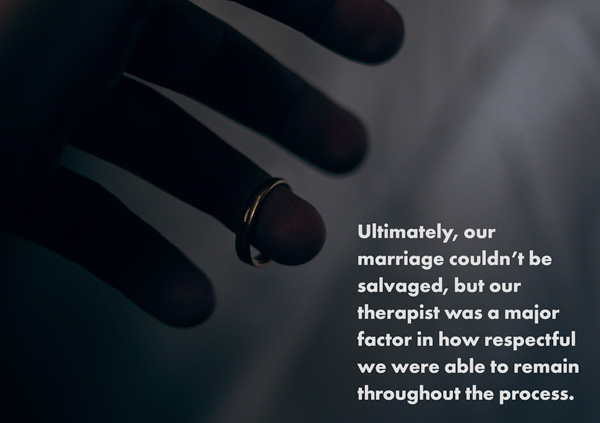
A Few Things to Consider If You Have Kids
Tell Your Kids Together
There are different scripts out there for how to tell your kid or kids you’re getting a divorce depending on the age. Here’s the bottom line: 1. It’s not your fault. 2. We both still love you and we’ll always be your parents. 3. Seriously, it’s not your fault.
Even if your divorce has something to do with your kid, talk to your therapist about that…not your kid. If your divorce involves one parent leaving the kids behind, talk to your therapist about how to address that with your kids beyond telling them it’s not their fault.
You’re the adult, and yes you need to take care of yourself. But these are your kids, your babies, guard their hearts from this pain as much as you can. They didn’t ask for this, and now they have to deal with it.
A Ground Rule HAS to be No Badmouthing
When my ex and I split, our daughter was still a baby, so a joint custody arrangement is all she’s ever known. We agreed from the outset that we would never badmouth the other in front of our daughter. As far as my daughter is concerned, her mom and I get along great. To be fair, we do get along just fine, and because we co-parent, we text almost everyday. But being friendly doesn’t make us friends: we don’t socialize; we still argue occasionally, and we still get on each other’s nerves regularly – after all, there are reasons we’re no longer married.
This ground rule also has to apply to step-parents. My daughter’s step-dad and I are as different as two men can be. But as far as my daughter knows, he and I are chums. Why? Because she deserves to see that all of the adults in her family are doing the best they can to keep her life as love-filled and anxiety-free as possible. That matters – pride, arrogance, and adult hurt feelings don’t matter as far as kids are concerned. Protect your kids by holding your tongue.
Decide On A Custody Agreement That’s Best for the Kids
I’ll tread lightly here because everyone’s family dynamic is different. My ex and I agreed that 50/50 custody was best for our daughter, and our work schedules and financial situations have allowed for that. We also make sure we are flexible and equitable. If one of us needs to switch a day, the other tries to accommodate, and for us, switch doesn’t mean forfeit.
Of course this is not the case for everyone. The most important factor in a custody conversation is what’s healthiest for the kids. This conversation absolutely needs to happen with your therapist, and if the three of you don’t agree, then step it up to a mediator, and then if needed, get the lawyers involved. Whatever you decide, put it in writing.
If you’re starting to have the divorce conversation, or you’re currently in the throes of it, I’m so sorry. It sucks; there’s no eloquent way to put it. Remember that despite the anger or hurt that you and your spouse are feeling, both of you are people who ultimately want to be happy. I don’t know that there’s such a thing as a perfect divorce: My ex and I are both happy, and we get along well enough, but I only see my daughter for 50% of her life, and I will never get used to that.
And even if you don’t have kids, no one likes to say they’ve had a marriage end. Know that you can and will get through this, that the sun will rise tomorrow and the next day, and that happiness is on the horizon even if you don’t yet know what it will look like.
You can do this; you’ll be ok.
For dealing with the emotional suck, read next: How to Get Over an Adult Breakup: A Thoughtful Man’s Survival Guide
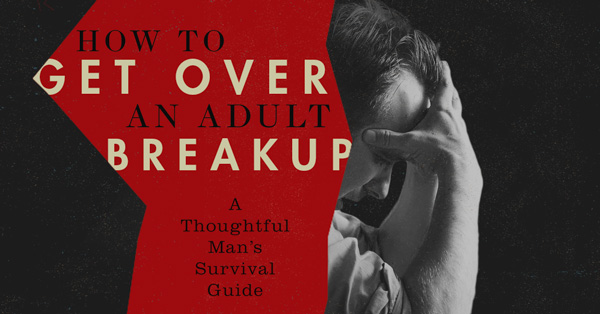



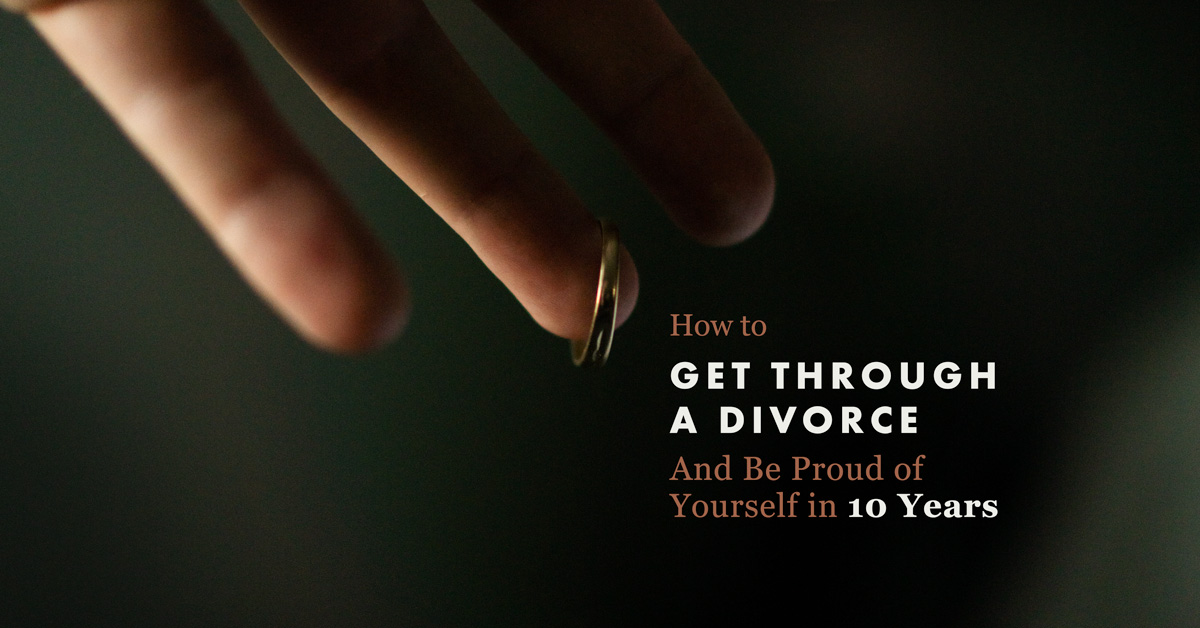




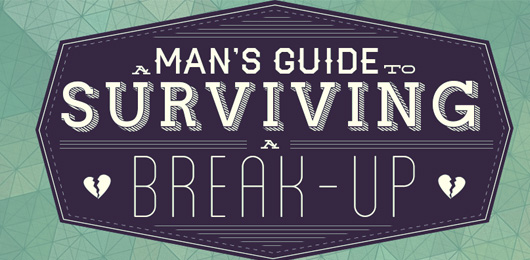

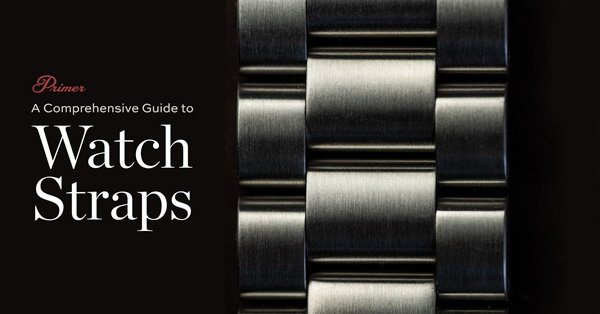




![It’s Time to Begin Again: 3 Uncomfortable Frameworks That Will Make Your New Year More Meaningful [Audio Essay + Article]](https://www.primermagazine.com/wp-content/uploads/2025/01/begin_again_feature.jpg)
